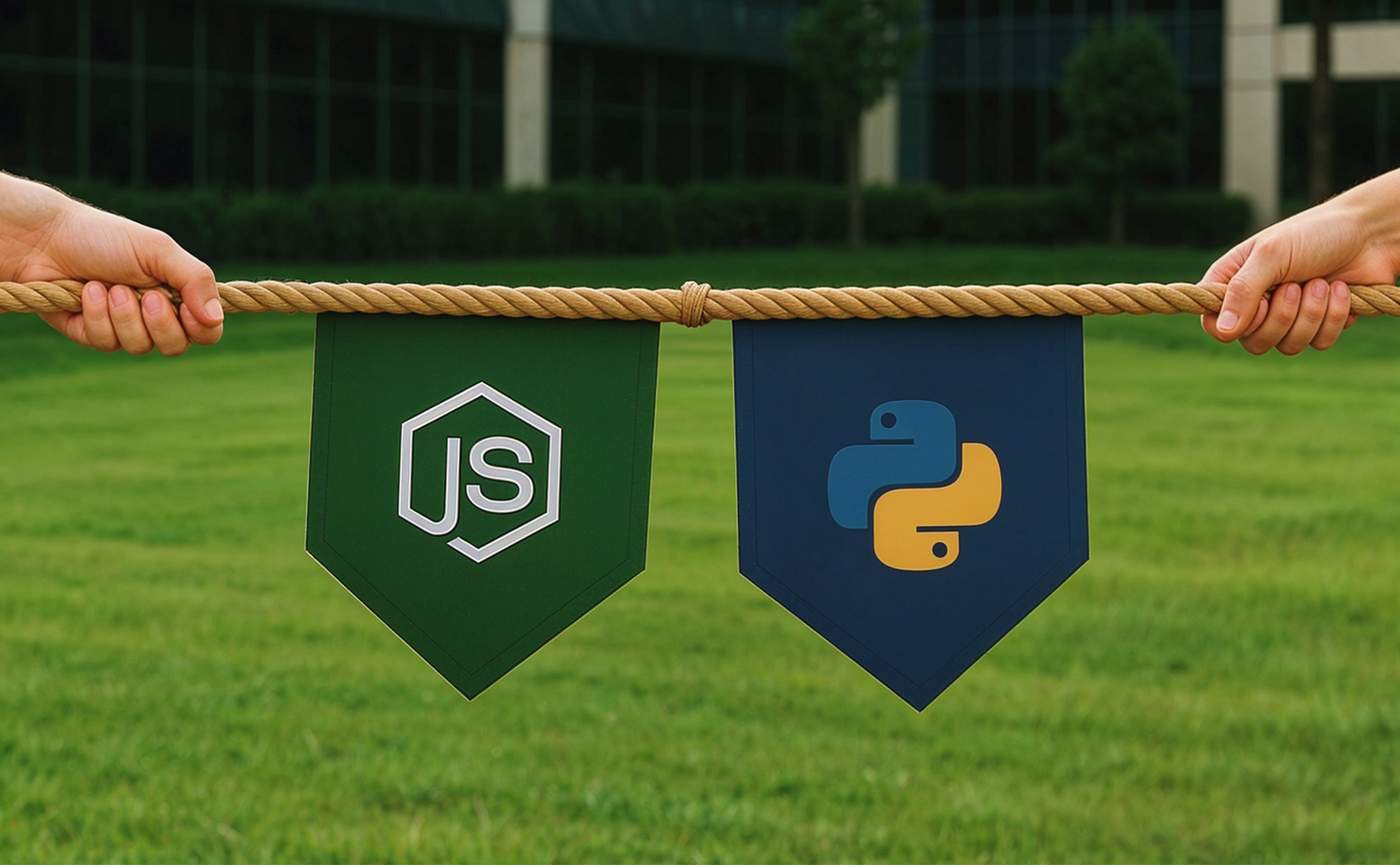Vue vs React: Which Technology Is Best for Your Next Project?

When building present-day web applications, many terminologies and technologies continuously strive to contribute to their successful implementation. As a business owner, it isn’t only about hiring a team of developers but also about choosing the ideal tech stack for your project. React and Vue are the most popular technologies helping in JavaScript web development. According to the 2024 StackOverflow survey, React is one of the most used web technologies, with a usage score of 39.5%, while Vue has a usage score of 15.9%.
Vue.js is an open-source JavaScript framework that lets you build single-page applications and user interfaces. React is an open-source JavaScript library which helps build user interfaces and custom applications. While both play a role in catering to modern web applications, choosing among them is still a reason for debate. What distinguishes React from Vue, and which one would you opt for your next project? This blog will be a go-to guide that briefly explains the differences between Vue and React, the upsides and downfalls of each, with the best tips on which one to use for your project.
What is React – An Overview
JavaScript library created by Facebook, React.js, is used to build user interfaces. Developed in 2011 to fulfil Meta’s internal uses and officially released in 2013, React.js is now one of the most prevalent tools for creating interactive user interfaces. The great thing about React.js is that it helps developers develop single-page applications (SPAs) pretty quickly. While the library is highly leveraged for web development, its component-based architecture, React Native, is ideal for iOS and Android mobile app development. It lets developers create mobile-friendly components efficiently.
Why do Developers Use React?
While many still misunderstand React.js as a JS framework, this is an open-source JavaScript library that builds web applications using a robust interface. As per the latest reports on GitHub, React has more than 1600 contributors and has gained over 233K stars. Also, while talking about the developer’s choices, the StackOverflow survey 2024 shows that React.js is the second most popular web frontend technology (39.5% of votes).
Benefits of React
Simple UI Library: Compared with other libraries or front-end frameworks, React is the simplest and well-defined lifecycle, adopting a component-based strategy. It uses a unique syntax called JSX (JavaScript extension), with JavaScript and HTML (Hypertext Markup Language).
Dynamic Web App Development: React.js uses JSX, supporting HTML quotes and syntax, enabling the ease of rendering code subcomponents. It also uses HTML strings and machine-readable codes to create dynamic web applications.
Reusable Components: Built with multiple components with logic and controls, React.js executes small, reusable HTML code lines. You can easily use its components to develop and maintain web applications. It also helps develop complex apps by creating nested components.
Optimised Web App Performance: React.js uses a virtual DOM (Document Object Model) that deals with XML (eXtensible Markup Language), HTML, and XHTML (Extensible Hypertext Markup Language), improving the web application’s performance. The virtual DOM here resides in memory, enabling direct updating of code in it, resulting in high-performing apps.
Large Global Community: As an open-source JavaScript library, React.js has a vast community actively working to improve the technology and offer support to others who experience a problem.
SEO-Friendliness: React.js works on the server side, enabling the rendering of the Virtual DOM on the browser as a regular web page, utilising the Next.js script.
Ready to leverage React’s power for your next project?
Reach out to usLoading...
What is Vue – An Overview
Vue.js is a front-end open-source JS framework specifically designed to let developers build web applications and user interfaces. Created in 2014 by Evan You, this was developed to create something that works more flexibly than Angular. This is a well-known choice for web development due to its flexibility, simplicity, and robust features. It is a simple and efficient tool that helps to create web applications with a component-based model, making it a high-rated choice for developers.
Why do Developers Use Vue.js?
Vue.js has a Reddit community with 199K members, and it is among the top 5% of communities based on size. Vue.js is popular among developers and is known for its simplicity, flexibility, and ease of learning. It also ensures easy integration with existing projects, making it an ideal choice to build simple and complex web applications.
Benefits of Vue
Simplicity: It includes a single-file component-specific architecture with CSS, HTML, and JS codes. It makes it easier for the developers to test particular app code parts independently, identify the code flow and errors, and optimise the application.
Lightweight: The framework is around 20kb in size. Hence, it lets you download and install it into the system quickly without taking up much space.
An Array of Support Tools: Though with a small file size, it offers an array of support tools. To mention, a globally installed npm package, i.e., Vue CLI, is responsible for fast scaffolding of new projects with the help of Vue Create.
Adaptability: Vue provides additional markup to the HTML code, while the other front-end technologies demand writing the code from scratch.
Ease of integration: If you have a micro frontend architecture in your web application using some other frontend technologies such as React or Angular, using Vue.js alongside has no constraints. It can easily get along with these front-end technologies, enabling ease of app UI customisation.
Vue.js and React Similarities
Vue.js and React are well-known front-end technologies, highly adopted by web app development companies worldwide. While they have their key distinguishing features, they also include shared characteristics contributing highly to their increased demand. Let’s dive into these similarities:
Virtual DOM for Performance Optimisation
They use a Virtual DOM to enable efficient updates of the particular components that have changed. It is a time-efficient process and specifically caters to complex UI applications.
Component-Specific UI Development
Both React and Vue can break down their User Interface into reusable and self-contained components. This property helps to scale development, improve productivity and bring products to market faster.
Focus on the View Layer
Both of them focus mainly on the view layer. This means they manage only the UI and need additional tools or external libraries to manage state management or routing.
Shortened Learning Curve
They are built around JS. Considering the developers, familiarity with JavaScript reduces the learning curve and improves the adoption rate, helping them deliver high-quality code in the least timeframe.
A Quick Comparison of Vue Vs React
Let’s have a quick comparison between these popular technologies (Vue.js Vs React.js) in the table below:
| Aspect | React.js | Vue.js |
| Definition | JavaScript Library | JavaScript Framework |
| Creator | Facebook (Jordan Walke) | Evan You |
| Release | 2013 | 2014 |
| Website | https://react.dev | https://vuejs.org |
| Virtual DOM | + | + |
| Open Source | + | + |
| Syntax | JSX (JavaScript XML) | HTML (default), JSX. |
| Key Features |
|
|
| Examples | Facebook, Instagram, Pinterest, Netflix, and Twitter. | Gitlab, Behance, Trivago, and Statista. |
React Vs Vue: Differences and Detailed Comparison
Vue.js and React.js have many common features. However, you’d be curious to know why exactly you should choose one over the other. Here’s a detailed comparison that explains their key differences, helping you get closer to the decision.
1. Core Library & Application Size
App size helps to know how well an application performs. In Vue.js, you can compress the same code so that it consumes less space compared to the same code written in React.js. Generally, Vue.js applications are 10-30% smaller than their comparable React applications. Vue.js testing library lets the app run quickly. There are many features in Vue’s official library; only 80kb is needed to build most applications. React.js, on the contrary, needs to download additional libraries. This means the size keeps increasing with the installation of new features.
Verdict: Go for Vue.js for smaller and faster applications. In case of large-scale and complex applications, React.js is an ideal choice you can go for.
2. Scaling: Data Flow
Vue.js and React.js have great scaling solutions. In either case, state changes can be collectively brought to perform independent functions with separate conditions set for every state. Vue has an infrastructure similar to React with a Vuex system for state management, leveraging a native unidirectional data flow. It also supports bidirectional data binding for easy data management, helping users focus on the data directly. Vue’s reactivity system is built into the framework, making it easier to track changes and update the DOM. React.js has smart components offering state management library functions, while it uses dumb components to define the actions to be taken under particular situations. React.js has a huge developer ecosystem, more templates, and additional tools, whereas Vue.js is ideal for scaling projects better with high performance.
Verdict: React.js is the prime choice for developing large and complex applications, whereas Vue.js is preferred for developing simple and quick web applications.
3. Performance
Various factors influence the performance of an app, including the efficiency of virtual DOM rendering and the intuitiveness of the development process. Vue and React use a browser-independent virtual DOM, which makes the infrastructures identical while ensuring great speed and performance. Vue.js identifies updates much faster. It tracks components and identifies the updated reusable components automatically. React is a bit complex here, with child components to be optimised with every change you make.
Verdict: While both React and Vue offer robust performance, Vue.js efficiently handle updates with less manual intervention than React.js.
4. Mobile Development
Both React.js and Vue.js are designed to support web application development. However, it isn’t the only way to use them. Vue.js doesn’t include an official mobile app development solution. Rather, it can be combined with Weex, which is a mobile UI framework that supports Vue components to build mobile apps. Whereas React has a huge advantage. The React Native framework lets developers build native iOS and Android applications with the same component structure as React. This enables developers to build cross-platform frontends.
Verdict: If you need to develop mobile applications, React.js is the winner.
Ready to build high-performance mobile apps?
Let's talkLoading...
5. Popularity
React and Vue have achieved different levels of popularity at different times. But when talking about actual numbers, let’s make it clear. While taking a look at Stack Overflow’s Developer Survey for 2024, React.js is the most popular option with 39.5% of developers choosing it, and Vue.js is at 15.4%. React.js is highly recommended for commercial brands and industry giants. Businesses are way more likely to look for a React.js developer over a Vue.js developer.
Verdict: React is the popular developer’s choice, but Vue is easier and quicker to learn for beginners.
6. App Scalability
React has an extensive ecosystem and is widely adopted while offering an array of third-party libraries and tools. At the same time, Vue.js isn’t the best choice for large-scale app development as it still needs to evolve. However, you can do this by relying on the component-specific architecture that ensures breaking down code into smaller repositories is easy to manage. Nevertheless, Vue’s smaller ecosystem could limit the availability of specialised tools and libraries.
Verdict: React has a rich ecosystem and flexibility that suits large-scale applications for specialised integrations. Vue has a structured approach and benefits teams that need simplicity in scaling applications.
7. Flexibility
With a greater degree of flexibility, React lets developers choose and integrate third-party tools and libraries that align with their project requirements. The modular approach helps custom solutions but needs developers to frame decisions on state management, routing, and related functionalities, thereby increasing complexity. Vue, on the other hand, offers a highly opinionated framework with official solutions for tasks like Vue Router for routing and Vuex for state management. This structured approach makes development easier through a cohesive set of tools and without needing external integrations.
Verdict: React is highly flexible and used for largely customised applications but could cause complexity, demanding careful handling. Vue takes a structured approach with official libraries and offers a streamlined development experience, helping teams that need simplicity.
Choosing Between Vue JS vs React?
To pick a clear winner between Vue.js and React.js, the ideal solution is to know your use case and outline it based on the nuances of these platforms.
Choose Vue if you:
- Wish to work on a smaller project, you need to learn and complete it quickly;
- Plan to build progressive web apps and single-page apps;
- Need to scale up the functionalities of the existing app.
Choose React if you:
- Facilitate projects with vast tools and libraries;
- Requires building a large app with greater complexity and reduced time to market;
- Wish to create an app with great components and increased responsiveness.
Here are the use cases that let you understand the applications that recommend React and Vue.js to determine which one fits your project the best.
React.js Use Cases:
Web applications, single-page applications contributing to multiple industries, enterprise applications, Progressive Web Apps (PWAs), AI and Machine Learning interfaces, interactive landing pages, cross-platform mobile apps (React Native), dashboards and data visualisation tools, social media platforms, e-commerce sites, SEO-friendly websites (when used with Next.js), and customised solutions under budget.
Vue.js Use Cases:
Single Page Applications (SPAs), small to medium-sized projects, e-commerce websites, Content Management Systems (CMS), dashboards and analytics tools, cross-platform applications, collaborative tools and applications, dynamic forms, real-time updates, community websites and forums, lightweight hybrid apps, static site generators, micro-frontend architecture.
Summing Up
To conclude, both Vue and React have significant roles in web application development. Their versions undergo improvements, bringing new versions and enabling developers and businesses to ensure better user experiences. As discussed in the previous sections, React is an option when you need to build complex web applications. This is an amazing option for creating user interfaces, so you can use it to offer custom SaaS development and software services.
On the other hand, Vue.js is an ideal choice if you need to create lightweight and simple web applications. It has a reduced learning curve and lets new developers master the technology quickly. At WAC, we are pioneers in building the best web applications with the potential of React.js development services, making your complex web applications highly performing and functional.
As a leading React.js Development Company, we have experts who offer the best support and assistance, helping you get equipped with the best technologies to keep your applications robust, smooth, and reliable. Hire dedicated React.js developers and hire Vue.js developer resources from us to scale your team and accelerate your project delivery. To learn how we help you with various frameworks, libraries and technologies, reach out to us!
Struggling to choose between React and Vue?
Let's talkLoading...
- Laravel With React: How to Build Modern Web Applications?
- Next JS vs React: Key Differences and Which Front End Framework to Choose in 2026?
- Angular vs React: Which Should You Choose for Frontend Development in 2026?
- Top Features and Benefits of Using React JS for Web Development
- Pros and Cons of using WordPress with ReactJS
Discover Digital Transformation
Please feel free to share your thoughts and we can discuss it over a cup of tea.










